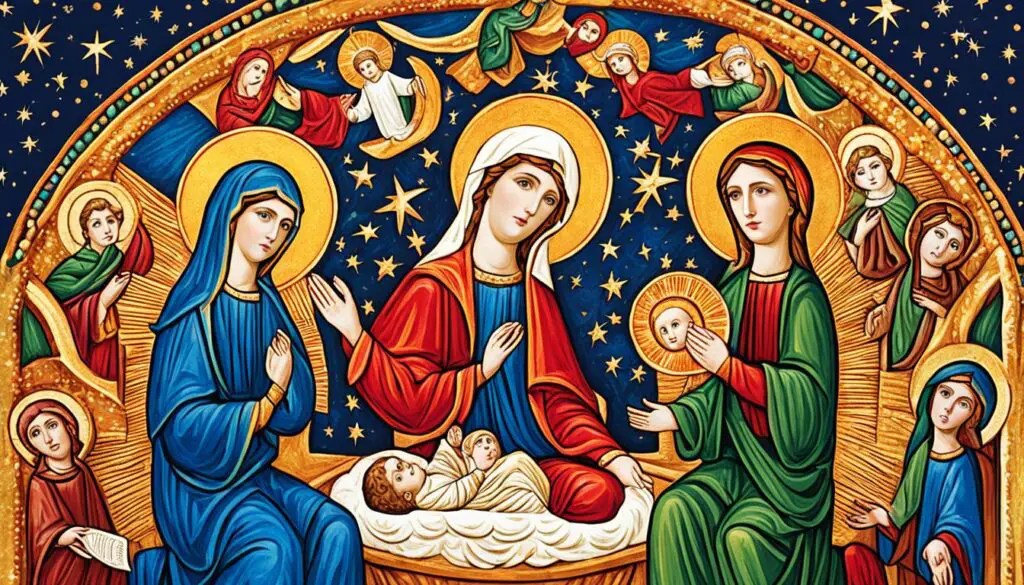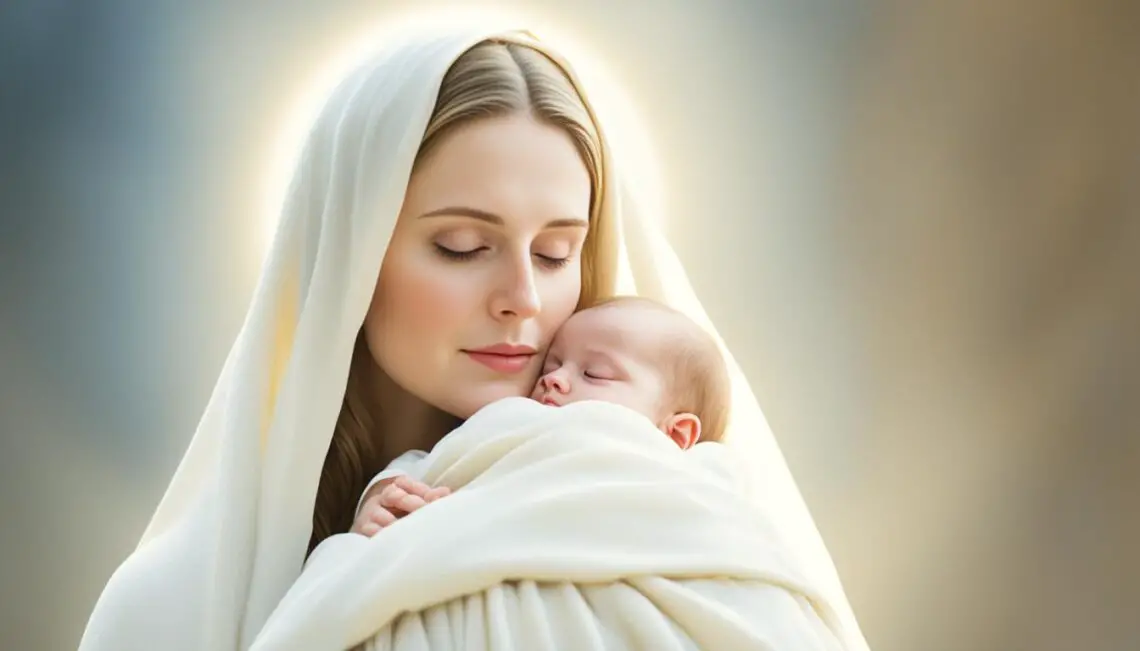In this article, we will embark on a fascinating journey to uncover the truth about Mary’s age at the time she gave birth to Jesus. This momentous event holds great significance for millions of believers around the world and understanding Mary’s age adds depth to our understanding of her role in history.
As we explore the biblical accounts and historical context, we will gain insight into Mary’s background and early life. By delving into the cultural norms of the time, we can better comprehend the circumstances that shaped Mary’s journey.
Discover the intricacies of Mary’s betrothal and engagement to Joseph, the man chosen as her spouse. We will explore the cultural traditions and expectations that governed their union, shedding light on the context in which Mary’s age played a pivotal role.
The story of the Annunciation will captivate our attention as we delve into the miraculous encounter between Mary and the angel Gabriel. Understand Mary’s acceptance of her divine calling and how it relates to her age at Jesus’ birth.
Follow Mary’s journey alongside Joseph as they make their way to Bethlehem for the census. Experience the challenges they faced and the profound significance of their arrival in Bethlehem for the birth of Jesus.
Lastly, we will explore the conflicting theories and scholarly opinions surrounding Mary’s age when she gave birth to Jesus, examining both biblical accounts and historical records. This exploration will shed light on the broad spectrum of perspectives and interpretations.
Key Takeaways:
- Mary’s age at the time of Jesus’ birth is a subject that holds great significance for believers worldwide.
- Understanding Mary’s background and cultural context adds depth to our understanding of her journey.
- The betrothal and engagement to Joseph provide insights into the cultural norms of the time.
- The Annunciation and Mary’s acceptance play a crucial role in understanding her age at Jesus’ birth.
- Following Mary’s journey to Bethlehem provides a deeper understanding of the challenges she faced.
Exploring Mary’s Background and Early Life
To truly comprehend and appreciate Mary’s age at Jesus’ birth, it is essential to delve into her background and early life. Through a deep dive into the biblical accounts and historical context, we gain valuable insights into Mary’s upbringing and the cultural norms that shaped her.
Mary’s background is rooted in the rich tapestry of religious and cultural heritage. Born into a devout Jewish family, she grew up steeped in the traditions, values, and teachings of her faith. The scriptures offer glimpses of her lineage, tracing it back to the House of David, a significant lineage in Jewish history.
From her earliest years, Mary’s piety and devotion shone brightly. Her unwavering faith and commitment to God established a foundation that would shape her remarkable journey. The reverence bestowed upon Mary by believers is deeply intertwined with the purity and devotion that radiated from her from her early days.
As we explore Mary’s early life, we gain a deeper understanding of the societal norms and expectations of the time. In ancient Jewish society, it was customary for young women to be betrothed at an early age, often during adolescence. This betrothal period was a significant event, symbolizing a formal agreement between families regarding a future marriage. Mary’s betrothal to Joseph, a righteous man chosen to be her spouse, played a pivotal role in shaping her life’s trajectory.
Through our exploration of Mary’s background and early life, we uncover the foundations upon which her extraordinary journey unfolded. From her devout upbringing to the societal expectations of the time, these elements offer crucial insights into understanding Mary’s age at the momentous occasion of Jesus’ birth.
Mary’s Betrothal and Engagement to Joseph
In the journey of Mary’s life, a significant turning point occurred with her betrothal and subsequent engagement to Joseph, the man chosen as her spouse. This pivotal moment was not only a personal milestone but also one imbued with cultural traditions and expectations.
The betrothal of Mary and Joseph was a formal agreement that signified their commitment to each other and their intention to marry. In ancient Jewish culture, betrothal held legal weight and was comparable to a binding contract between two families.
During this period, Mary would have been in her early teens, as was customary in that time and culture. It is essential to understand that societal norms regarding age and marriage were different from those of today. The betrothal marked a significant step towards adulthood and signaled Mary’s readiness for marriage.
Engagement in biblical times was a more prolonged and complex process compared to modern practices. It involved a public announcement of the impending union and a waiting period of approximately one year. This interval allowed time for the couple to prepare themselves spiritually, emotionally, and financially for marriage.
Joseph, a righteous man, soon became aware of Mary’s miraculous pregnancy, causing initial turmoil and confusion. However, through divine intervention, an angel appeared to Joseph in a dream, revealing the supernatural nature of Mary’s conception and instructing him to proceed with the marriage.
The image below depicts the symbolic significance of Mary’s betrothal and engagement to Joseph:
As Mary embraced her role as the chosen vessel for the birth of Jesus, her betrothal and engagement to Joseph took on even greater spiritual significance. They provided the foundation for her journey as the mother of the Messiah, shaping her character and unwavering faith in God’s plan.
Continue reading to uncover the next chapter in Mary’s story, “The Annunciation and Mary’s Acceptance,” where we explore the profound moment when the angel Gabriel appeared to Mary to announce the divine conception.
The Annunciation and Mary’s Acceptance
One of the most significant moments in Mary’s life is the Annunciation, when the angel Gabriel appeared to her to announce the divine conception.
“Do not be afraid, Mary, for you have found favor with God. And behold, you will conceive in your womb and bear a son, and you shall call his name Jesus” (Luke 1:30-31). With these words, Mary’s life changed forever.
Imagine the scene, the overwhelming presence of an angel, delivering this momentous message that would forever reshape Mary’s life and the course of history. Mary, a young woman filled with faith and trust, wholeheartedly accepted the divine plan set before her.
Her acceptance was not a passive surrender but an act of courage and devotion. Mary’s unwavering faith in God’s plan allowed her to embrace the extraordinary responsibility of being the mother of the Messiah. She willingly accepted the challenges and uncertainties that lay ahead.
“Behold, I am the servant of the Lord; let it be to me according to your word” (Luke 1:38). These words reflect Mary’s resolute acceptance of the divine calling placed upon her. It was her steadfast faith and obedience that made her an exemplary model of humility and trust.
The Annunciation is a moment of awe-inspiring significance, marking the beginning of the miraculous journey that would lead to the birth of Jesus. It speaks to the profound faith and courage of Mary, who embraced her role with grace and humility.
Through her acceptance, Mary became the vessel through which God’s plan of salvation would be fulfilled. Her willingness to surrender herself to God’s will, regardless of the challenges it presented, exemplifies the strength and devotion that believers aspire to emulate.
Mary’s Journey to Bethlehem
Follow Mary’s Journey to Bethlehem alongside Joseph as they embarked on a significant pilgrimage. Their travels were not merely a physical journey but a divine appointment, leading them to the birthplace of Jesus.
As the couple embarked on their arduous trek, they faced numerous challenges along the way. The path to Bethlehem was fraught with uncertainties, but their unwavering faith in God’s plan sustained them.
The image below depicts the awe-inspiring landscapes that Mary and Joseph encountered during their Journey to Bethlehem:

Their arrival in Bethlehem held immense significance, as it fulfilled ancient prophecies and marked the fulfillment of God’s promises. Bethlehem, the City of David, would be the birthplace of the long-awaited Messiah.
Through their Journey to Bethlehem, the couple exemplified obedience and trust, showcasing the power of faith in the face of adversity. Mary’s unwavering commitment to God’s plan serves as an inspiration to believers worldwide.
Next, in Section 6, we will explore the Birth of Jesus and delve further into Mary’s age during this momentous event.
The Birth of Jesus and Mary’s Age
Finally, we arrive at the long-awaited moment of Jesus’ birth. This pivotal event holds immense significance in Christianity as it marks the arrival of the Messiah, the Savior of the world. As we explore the biblical accounts and historical records, we uncover the intriguing question of Mary’s age at this momentous occasion.
The birth of Jesus is steeped in awe-inspiring wonder and divine purpose. It is a story that has captivated the hearts and minds of believers for centuries. However, when it comes to determining Mary’s age at this extraordinary event, there is a range of conflicting theories and scholarly opinions.
Some scholars argue that Mary was likely a young teenager at the time of Jesus’ birth. This perspective is rooted in historical and cultural context, as it was customary for girls to be betrothed and married at a relatively young age during that period. This understanding aligns with the biblical narrative of Mary’s engagement to Joseph and the societal norms of the time.
On the other hand, there are differing viewpoints that suggest that Mary may have been older, with some theories proposing she could have been in her early twenties. These theories often draw upon alternative interpretations of historical records and cultural practices.
While we may never know with certainty the exact age of Mary when she gave birth to Jesus, what remains undeniable is the profound impact of this miraculous event. The birth of Jesus, regardless of Mary’s age, symbolizes hope, redemption, and the fulfillment of prophecy.
As believers reflect upon this sacred moment, it allows us to ponder the divine power and sovereignty at work. It reminds us of the humble beginnings of our Savior and the unconditional love that God bestowed upon humanity through the incarnation of His Son.
The Role of Mary as Mother
Reflect on the immense responsibility and role that Mary embraced as the mother of Jesus. Through her unwavering faith and devotion, Mary played a pivotal role in the story of salvation. As the chosen vessel to carry and nurture the Son of God, Mary’s significance as a mother goes beyond human comprehension.

Despite her young age, Mary displayed extraordinary courage and strength in shouldering the weight of her divine calling. As a tender, nurturing mother, she provided love, guidance, and support to Jesus throughout his life. Her unwavering faith in God’s plan enabled her to navigate the challenges and uncertainties that came with raising the Savior of humanity.
The role of Mary as a mother exemplifies selflessness, sacrifice, and unconditional love. She witnessed her son’s ministry, miracles, and ultimately his crucifixion, standing by him with unwavering devotion. Mary’s unwavering faith and steadfast love serve as an enduring example for mothers around the world, reminding them of the immense impact they have in shaping the lives of their children.
As we honor Mary as the mother of Jesus, we recognize the profound influence she had on his life and ministry. Her gentle yet strong presence provided the foundation for Jesus’ teachings of compassion, forgiveness, and love. Mary’s role as a mother continues to inspire and guide countless individuals as they navigate the joys and challenges of parenthood.
Mary’s Influence and Legacy
Mary’s Influence and Legacy
Throughout history and within Christianity, Mary’s influence and legacy have left a profound impact on believers around the world. Her young age at Jesus’ birth has inspired and resonated with generations, shaping the faith and devotion of countless individuals.
From the moment of the Annunciation to her role as Jesus’ mother, Mary’s unwavering faith and obedience serve as a powerful example for all who seek to follow Christ. Despite the challenges she faced as a young mother, Mary embraced her divine calling and raised Jesus with love, grace, and humility.
Image:
As the mother of Jesus, Mary witnessed firsthand the miracles, teachings, and ultimate sacrifice of her son. Her presence at the foot of the cross during Jesus’ crucifixion exemplifies her steadfast faith and unwavering devotion to God’s plan.
Mary’s influence extends beyond her role as Jesus’ mother. She is venerated as a saint in many Christian traditions, and her intercession is sought by believers in times of need. Her life serves as a testament to the transformative power of a young person’s faith and willingness to serve God.
The legacy of Mary endures through the devotion and prayers offered in her name. She is revered as a model of faith, humility, and obedience, reminding believers of the importance of surrendering to God’s will and trusting in His divine plan.
Today, Mary’s influence can be seen in the countless churches, art, and literature dedicated to her honor. She continues to inspire and guide believers, symbolizing the strength and beauty of a life dedicated to God.
Discovering Mary’s Influence Today
As we explore Mary’s influence and legacy, it is essential to reflect on how her story resonates in our lives. Just as Mary’s faith shaped her journey, we too are called to embrace our own divine purpose and follow Christ with unwavering devotion.
Through acts of love, compassion, and service, we can embody the legacy of Mary and impact the world around us. As we honor her example and draw inspiration from her faith, may we continue to strengthen our own relationship with God and make a lasting difference in the lives of others.
Continue to Section 9: Cultural Perspectives and Interpretations
Cultural Perspectives and Interpretations
Understanding the age of Mary at the birth of Jesus involves exploring the diverse interpretations and cultural perspectives surrounding this significant event. The theological beliefs and societal norms of different cultures have shaped varied viewpoints, adding depth and richness to the understanding of this historical context.
The interpretations of Mary’s age vary across different religious traditions and scholarly perspectives. Some believe that Mary was a young teenager when she gave birth to Jesus, while others contend that she may have been older. These differing viewpoints stem from the interpretation of biblical texts, historical context, and cultural norms of the time.
One interpretation considers the cultural practices of the ancient Near East, where young girls were often betrothed and married at an early age. In this perspective, Mary’s youth highlights her innocence and faithfulness, as she trusted in God’s plan for her life. This interpretation emphasizes the profound trust and obedience that Mary demonstrated, regardless of her age.
On the other hand, some scholars propose a different viewpoint based on historical and cultural analysis. They suggest that Mary’s age at the time of Jesus’ birth may have been older than traditionally depicted. This interpretation challenges the assumption of a young teenage Mary and explores the possibility of a more mature Mary, highlighting her wisdom and life experiences.

The diversity of cultural perspectives also contributes to the understanding of Mary’s age at Jesus’ birth. Different cultures and societies have their own traditions and beliefs, which may influence their interpretations. The cultural lens through which one views the biblical account can shape the understanding of Mary’s age, reflecting the nuances and unique perspectives of each culture.
By examining the cultural perspectives and interpretations surrounding Mary’s age at the birth of Jesus, we gain a deeper appreciation for the complexity and significance of this historical event. It reminds us of the interconnectedness of history, culture, and spirituality, and how these elements shape our understanding of biblical narratives.
Conclusion
Throughout this article, we have explored the intriguing inquiry of Mary’s age at the birth of Jesus. By delving into the biblical accounts, historical context, and cultural norms of the time, we have gained valuable insights into this momentous event.
Understanding Mary’s age at Jesus’ birth holds great significance not only for historical accuracy but also for its profound spiritual implications. It allows believers to connect more deeply with the miraculous nature of Jesus’ birth and appreciate Mary’s unwavering faith and courage as a young mother.
By recognizing the challenges Mary faced as a young woman in a patriarchal society and the immense responsibility she embraced as the mother of Jesus, we can draw inspiration and find strength in our own journeys of faith. Mary’s story reminds us that age is not a barrier to fulfilling our divine calling and that God can use us, regardless of our youth or inexperience.
In conclusion, the exploration of Mary’s age at Jesus’ birth offers us not only a historical understanding of this pivotal event but also a deeper connection to the transformative power of faith. As we reflect on Mary’s remarkable journey, may her story continue to inspire believers around the world and encourage us to embrace our own unique role in God’s plan.





